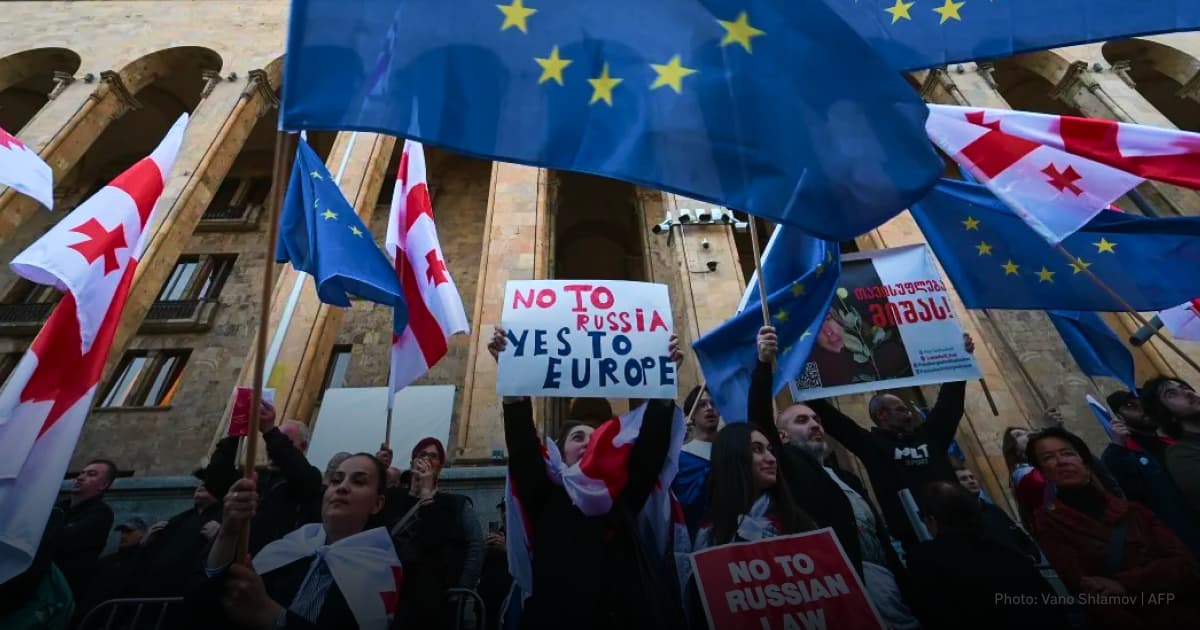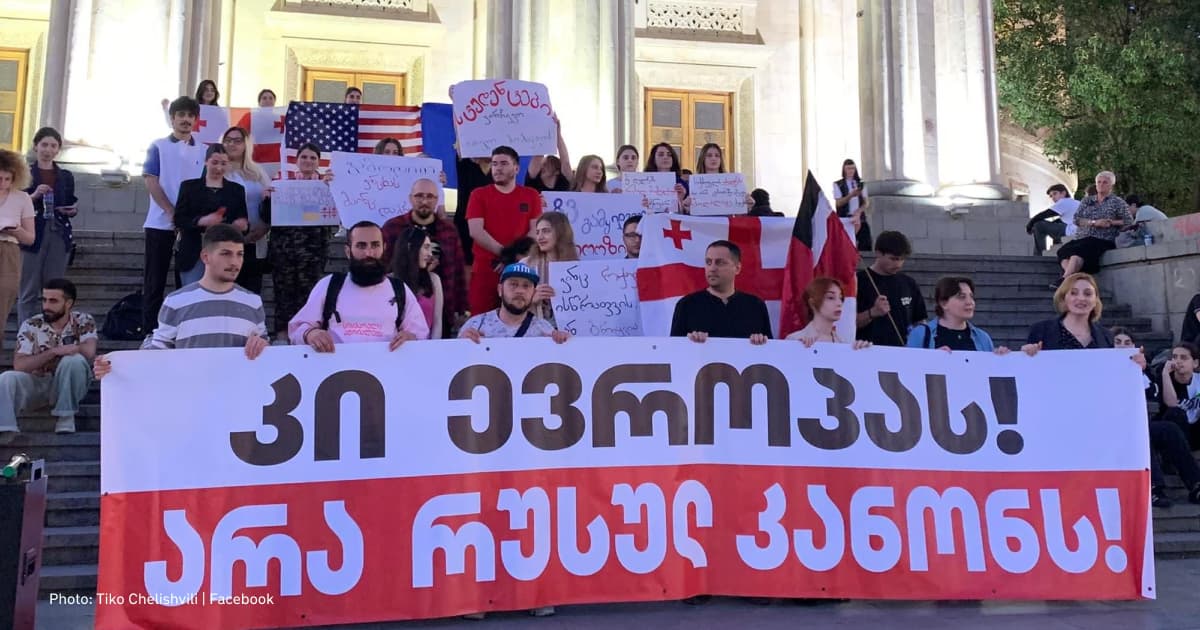Say no to Russian law: what is happening in Georgia?

What happened?
For nine days in a row, protests have been held in Georgia against the “Transparency of Foreign Influence” bill. The protests have been taking place every day since April 15. Initially, they were organised by non-governmental organisations, but since April 18, the protests have become self-organised, led mainly by young people.
The demonstrators gather every evening at 19:00 local time in front of the parliament building and then proceed to various state institutions, such as the Ministry of Justice, the government building or the Supreme Court. The protests are not confined to the capital, Tbilisi, with rallies also taking place in Batumi and Zugdidi.
It is the second time the ruling Georgian Dream party has proposed a bill on "foreign agents" or "foreign forces". Last year, the party postponed consideration of the bill due to mass protests in the country.
The new bill is almost identical to the previous one. However, the term "agent of foreign influence" has been replaced with "organisation that pursues the interests of a foreign power". The bill has already passed its first reading.
The bill obliges non-governmental companies and media outlets that receive more than 20% of their funding from abroad to register as an organisation that promotes the interests of a foreign power. Georgian Dream insists that such legislation is necessary for the financial transparency of grant recipients. However, activists and opposition parties say the bill is Russian and pro-Russian.
President Salome Zourabichvili of Georgia has said she will veto the bill. She supports the protesters.
What do people say in Georgia?
Katie Shoshiashvili, Senior Corruption Researcher at Transparency International Georgia and a participant in the protests, explains in a commentary for Svidomi that Georgia has long shown authoritarian tendencies, and the attempt to pass this law last year is a clear indicator.

Despite assurances from the ruling party that the bill would not resurface this year, we observe a continuation of this trend. This resurgence coincides with an election year (the country's parliamentary elections are scheduled for October 26 — ed.), a time when the role of civil society and the media becomes crucial in overseeing fair and transparent processes,
she explains.
Last year, the ruling party cancelled the adoption of the law on transparency of foreign influence after protests made it clear that the law was siding with Russia, which is unacceptable to the Georgian people.
"In fact, the protests underscored the people's unwavering commitment to defend Georgia's EU integration, which we view as crucial and existential. This underscores the significance of the ongoing protests against the reintroduction of the same Russian law under a different name this year," says Katie Shoshiashvili.
The legislative process in Georgia involves three hearings, both in committee and in plenary. The bill has already been approved at the first committee and plenary readings. The second hearing has been scheduled and is expected to take place during the week of April 29.

On April 22, the ruling party Georgian Dream has announced a "counter-meeting" for April 29, where they claim that supporters of the Russian draft law will convene. If we trust induction, this will probably happen by mobilising administrative resources. It is also noted that Oligarch Bidzina Ivanishvili (former prime minister, leader of the Georgian Dream, has Russian citizenship — ed.) will also be attending,
says Shoshiashvili.
According to the Georgian service of RFE/RL, about 40 demonstrators were arrested in Georgia over three days from April 15-17. Twenty-four of them are being represented by a coalition of lawyers from non-governmental organisations. After speaking to one of the lawyers, it emerged that most of the 24 detainees had been physically abused, resulting in injuries and bruises. In addition, all of them had been held in the detention centre for 48 hours, the maximum under Georgian law. Two others were sentenced to five days in prison, and one protester was fined 2500 GEL for disorderly conduct and disobeying the police.

The events of the night of April 16 were especially violent. As citizens were beginning to disperse and return home late in the evening, with some intending to remain on the streets, the riot police unexpectedly started a forceful dispersal. Without prior warning, they beat several journalists and citizens, and 13 were arrested,
says Katie Shoshiashvili.
"Against Ukrainisation"
The Prime Minister of Georgia and representative of the Georgian Dream, Irakli Kobakhidze, said that the bill on “transparency of foreign influence” was ostensibly a way to prevent the "Ukrainisation" of Georgia and a prerequisite for the country's integration into the EU.

If civil society organisations had achieved what they actively tried to do in 2020-2022, which is to change the government through revolution, Georgia would be in a worse situation today than Ukraine, which means leaving peace and European integration behind,
Irakli Kobakhidze said.
In response, the Ukrainian Foreign Ministry said it was outraged by the Georgian prime minister's comments. Diplomats called for the right of citizens to peaceful protest to be respected and for the conflict to be resolved through constructive dialogue.
How does the “Transparency of Foreign Influence” bill affect Georgia's European integration processes?
The European Union's High Representative for Foreign Affairs and Security Policy, Josep Borrell, and the European Commissioner for Neighbourhood and Enlargement Policy, Olivér Várhelyi, said that the Georgian law on transparency of foreign influence was not in line with the EU's basic norms and values.
"The Georgian Parliament passed the "transparency of foreign influence" law in its first reading, despite repeated calls by the European Union to retract such legislation and despite the mass protests. This is a very concerning development, and the final adoption of this legislation would negatively impact Georgia’s progress on its EU path. This law is not in line with EU core norms and values,’ the joint statement said.
Brussels believes that the bill will limit the ability of civil society and the media to operate freely, restrict freedom of expression and unfairly ostracise organisations that benefit Georgian citizens.
The EU called on the Georgian authorities "to refrain from adopting laws that could jeopardise the country's EU path, supported by the vast majority of Georgian citizens".
The European Parliament also believes the document will halt the country's European integration.
German Green MEP Viola von Cramon-Taubadel said she would initiate the withdrawal of Georgia's EU candidate status if the document, which "violates the freedom of NGOs and independent media", is adopted by Georgian MPs.

If this law is not rejected, there would no longer be the possibility of opening accession negotiations,"
Cramon said.
According to RFE/RL, the European Parliament is preparing a resolution that would say, among other things, that the EU should not start accession negotiations with Georgia as long as the "transparency of foreign influence" law is in force. However, the resolution does not envisage cutting off financial aid to Georgia or reconsidering the issue of visa liberalisation.









